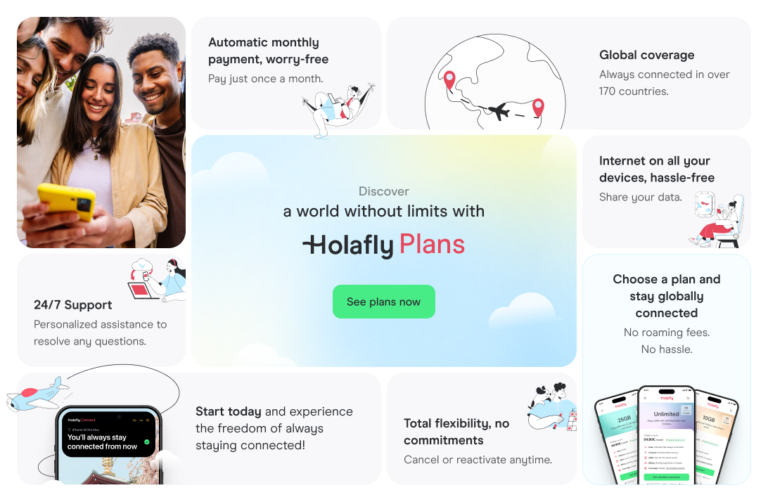Work and study abroad: Make the best of your time abroad
Do you dream of packing your bags to work and study abroad? We tell you everything you need to know before you leave.
Talk to anyone who’s taken the leap to work and study abroad, and chances are they’ll say it was one of the best decisions they’ve ever made. It’s not just about enrolling in a great university or learning a new language while figuring out how to live on your own — it’s the kind of life-changing experience that reshapes how you see the world. And as a bonus, it can open doors to some pretty amazing job opportunities, too.
That said, as exciting as the idea sounds, making it happen isn’t always easy. There are permits to sort out, big decisions to make, and the right opportunities to find if you want everything to go smoothly. That’s why we’ve put together this guide, to walk you through, step by step, how to work and study abroad in 2025. We’ll cover the top countries to kick off your adventure, explore study options, and highlight programs designed to help you reach your goal. Ready to start planning your international journey?
Why work and study abroad?
Studying and working abroad is a one-of-a-kind opportunity for both personal and professional growth. You’ll learn in a completely new academic environment, sharpen your language skills, and gain work experience that can truly set you apart in the future. On top of that, you’ll face challenges that push you out of your comfort zone and help you build skills you simply wouldn’t develop any other way.
What’s the biggest payoff? You’ll come back with a serious edge in your career. More and more companies are looking for people who’ve had international experience. Not just because of what they’ve learned, but because they’ve proven they can adapt, thrive in new environments, and bring a global perspective to the table. And while you’re covering your expenses, you’ll also get to travel, dive into new cultures, and grow your network across borders. In short, it’s the kind of journey that changes how you see the world
Permits to study and work abroad
Before you start packing, make sure you know what kind of visas or permits you’ll need to study and work overseas. The requirements will vary depending on your destination and how long you plan to stay. You might need a study visa, a work visa, or both. Understanding these details upfront will save you from headaches later on.
Let’s take a quick look at the most common permits you’ll need to study and work abroad, how they work and what steps to take to get them. That way, you can focus on what really matters: studying, working, and enjoying the experience.
1. Study permit
A study permit, often called a student visa, is essential if you want to legally study abroad. Whether you’re pursuing a university degree, a master’s, or a language course, this permit lets you stay in the country for the duration of your studies. But it’s not handed out to just anyone. In many cases, you’ll need to prove you have enough financial resources to support yourself, and in some countries, you’ll also be required to have health insurance.
In some countries, you can extend your stay if you choose to keep studying or move on to a higher-level program. As long as you understand the process, getting an extension isn’t too difficult.
- Who can apply for it? Individuals accepted into an academic program at a recognized institution in the country.
- Main requirements:
- Letter of acceptance from the university, institute or school.
- Proof of sufficient funds to pay for studies and living expenses.
- Medical insurance to cover the entire stay.
- Valid passport.
- Duration: Usually covers the duration of the academic program, although some countries allow extensions.
How to obtain it?
- Apply for the permit at the consulate or embassy of the country you are going to. In many cases, the process can be initiated online.
- Submit the required documents and pay the appropriate fees.
- Once approved, you’ll receive your student visa.
Estimated cost:
The price of the study permit varies by country. Some examples include:
- Australia: The fee is 1,600 Australian dollars ($1,040).
- Canada: The fee for a student visa in Canada is 150 Canadian dollars ($110).
- United Kingdom: The fee for a student visa in the United Kingdom is £490 ($620).
2. Student work permit
Balancing work and study is doable, but only with the proper permit. This extra visa option is ideal if you want to support yourself or build professional experience while you’re still in school. Usually, it lets you work part-time when classes are in session and full-time during holidays.
How this works depends on the country. In some places, the work permit comes automatically with your student visa, while others require you to go through extra steps.
- Who can apply for it? Foreign students with a valid student visa.
- Main requirements:
- Enrollment in a full-time academic program.
- Compliance with a limit of working hours per week (generally between 15 and 20 hours).
- Prior approval of educational institutions in some countries.
- Duration: Matches the duration of the student visa.
How to obtain it?
- In some countries, the work permit is included with the student visa.
- In other cases, you’ll need to submit an additional application to the country’s immigration service.
Estimated cost:
You have to check the fees of the country you want to move to. Let’s see some examples:
- Australia: Between 600 and 700 Australian dollars ($390-450).
- United Kingdom: Usually included in the Tier 4 visa.
- Canada: No additional cost if it is linked to the study visa.
3. Post-study work visa
A post-study work visa is ideal if you want to stay and work full-time after finishing your studies. It’s especially popular in countries that aim to keep international talent, like Australia, Canada, and Germany.
In some countries, you need a job offer to get your application approved. Others place more emphasis on your academic achievements and financial means.
- Who can apply for it? Graduates of recognized academic programs in the destination country.
- Main requirements:
- Successful completion of your academic training.
- Prove sufficient funds for your initial living expenses.
- Have a job offer in some cases.
- Duration: Depends on the country; can range from 6 months to several years.
How to obtain it?
- Submit your application to the immigration service of the country where you studied.
- Provide your academic transcript, proof of funds and other requested documents.
4. Work permit with volunteering or special programs
If you’re looking for more than just study or work and want a richer experience, a work permit tied to volunteer programs or special projects might be the right fit. These permits are meant for students involved in cultural exchanges, internships, or nonprofit work.
The great thing about this option is how flexible it is. You usually have more freedom with work hours, along with opportunities for training. It’s perfect if you want to build new skills while giving back or really getting involved in the local community.
- Who can apply for it? Persons enrolled in volunteer, exchange or internship programs.
- Main requirements:
- Invitation or acceptance by the organization.
- Proof of sufficient funds.
- Valid medical insurance.
- Duration: Limited to the duration of the program or activity.
How to obtain it?
- Apply for the permit at the corresponding consulate or embassy, submitting the required documents.

Options for studying and working abroad
Thinking about studying and working abroad but not sure where to begin? The good news is, there are plenty of options to choose from. The key is finding the program that best fits your goals and situation. Maybe you’re drawn to the structure of an academic exchange, the freedom of volunteering, or the stability of a university degree that lets you work at the same time. Each path comes with its own benefits and requirements.
Exploring these options also gives you a chance to dive into a new culture, pick up skills you won’t learn in a classroom, and build your independence. Let’s take a look at the most common ways to combine work and study abroad so you can find the best fit for you.
1. Academic exchanges
Academic exchange programs are one of the easiest ways to study abroad. They let university students spend part of their studies at a partner institution overseas, thanks to agreements between schools. One of the biggest perks? You usually keep paying your regular tuition, which makes the experience a lot more budget-friendly.
Erasmus+ or university exchange partnerships not only let you study abroad but also give you the chance to work part-time while you’re there. Beyond academics, this kind of experience is a big plus on your resume, showing you can adapt to new environments and thrive in diverse, international settings.
2. Applying for scholarships
Scholarships are a great way to make studying abroad more affordable. Plenty of universities, government programs, and private foundations offer financial support that can cover tuition, living costs, or both. It’s a great way to open doors to top universities and high-quality academic programs without breaking the bank.
Beyond easing the financial burden, some scholarships also let you work part-time. There are well-known options like the Fulbright program for studying in the U.S. or the UK’s Chevening scholarships, as well as others geared toward technical or professional fields. Doing your research and applying for these opportunities could be your ticket to making the dream of studying and working abroad a reality.
3. Volunteering
If you’re after something beyond the classroom, volunteering abroad can be a truly rewarding path. It gives you the chance to work with nonprofits, support local communities, or take part in cultural projects. And in some countries, you’re even allowed to take on paid work alongside your volunteer role.
These kinds of programs often come with perks like free housing and meals, making them even more accessible. It’s a great way to grow personally, immerse yourself in a new culture, and make a meaningful contribution to a cause you care about.
4. Courses
If you’re looking for something shorter and more flexible, taking courses abroad can be a great way to study while working. These might include language classes, technical training, or specialized workshops. In many countries, as long as your course lasts at least six months and you’re enrolled in an accredited school, you’re allowed to work part-time.
The great thing about this option is that you can pick programs that fit your schedule and goals. For instance, a language course can boost your communication skills while you work, and a technical course might open doors to in-demand jobs in your destination country.
5. University degrees
Studying for a degree overseas is a great way to invest in your future career and education. In places like Canada, Australia, or Germany, international students usually have the option to work part-time during their studies. Plus, programs in areas like engineering, nursing, or tech often include hands-on experience that make it easier to enter the job market.
Completing a full degree abroad can open doors to global career opportunities. After graduating, you might be eligible for post-study work visas that let you stay longer to build your professional experience.

Best countries to study and work abroad
Choosing where to study and work abroad isn’t easy. The country you pick will shape not only your academic journey but also the job opportunities available, the lifestyle you experience, and the cultural memories you take home. Some places are known for top-notch universities, while others have welcoming job markets for international students looking to support themselves or start their careers.
Are you drawn to a multicultural vibe like Canada’s? Or maybe affordable tuition in Germany is more your style? Each country has something unique to offer that can really influence your academic and career path. Let’s explore some of the top destinations and what they bring to the table, so you can choose the one that best matches your goals.
Australia: Study at top universities and work part-time
Australia is one of the top choices for international students. Its universities, like the University of Melbourne and the Australian National University, rank among the best worldwide. Plus, their student visa policies make it easier to work part-time while you study.
What makes Australia a perfect destination:
- Legal work while studying: You can work up to 20 hours a week during the school year and full time on vacations.
- Post-study opportunities: A post-study visa allows you to stay and work full time after graduation.
- Sectors with demand for students: Hospitality, tourism, services and agriculture.
- Quality of life: Cities like Sydney and Melbourne combine a cosmopolitan atmosphere with a great cultural offer.
Canada
Canada stands out for its high-quality education and friendly environment for students from abroad. Universities like Toronto and McGill are recognized globally for their strong reputations.
Why you should consider Canada:
- Work during your studies: You can work up to 20 hours per week and full time on vacations.
- Post-study visas: Allows you to stay in the country and access the labor market.
- Sectors with the highest demand: IT, health, engineering and services.
- Multicultural environment: Cities such as Toronto and Vancouver are known for their diversity and quality of life.
Germany: Low tuition fees and access to technical jobs
Germany is one of the most affordable places to study and work abroad. Thanks to its public universities, which charge little to no tuition for international students, it’s a popular choice. Plus, you can work part-time while studying, making it easier to support yourself during your stay.
Advantages of studying and working in Germany:
- Affordable access to education: Reduced tuition at public universities.
- Part-time work: You can work while you study, which makes it easier to cover your living expenses.
- Booming sectors: Engineering, technology and science.
- Post-study prospects: Specific visas allow you to stay and work after graduation.
United Kingdom: Academic prestige and job opportunities
The UK is another top destination for studying and working abroad. Universities like Oxford, Cambridge, and Imperial College London are world-renowned and offer programs designed to meet the demands of the global job market.
What makes the UK special for studying and working:
- Flexible student work: You can work 20 hours a week during the semester and full time during vacations.
- Post-study visa: Allows you to stay for up to two years after graduation to look for a job.
- Sectors with more opportunities: Finance, technology, business and education.
- Global access: An international network of contacts and companies with a global presence.
New Zealand: Innovative education and unique nature
New Zealand has become a favorite destination thanks to its stunning landscapes and high-quality education. Its universities provide innovative programs and practical work opportunities, often allowing students to work while they study.
Reasons to choose New Zealand:
- Work while studying: You can work 20 hours a week and full time during vacations.
- Post-study visas: Make it easy to stay and gain professional experience.
- Booming sectors: Tourism, agriculture and technology.
- Quiet and safe life: Cities like Auckland and Wellington offer a perfect balance between study and well being.
Ireland: IT and business in a dynamic environment
Ireland is quickly becoming a go-to spot for students from around the world. With strong programs in tech, business, and the humanities offered by universities and technical schools alike, it’s a great place to study. On top of that, students can work while they’re completing their courses thanks to supportive local policies.
Highlights of Ireland:
- Student work: Allows you to work 20 hours a week during the course and full time on vacations.
- Technology and pharmaceutical industry: Home to large multinationals and innovative startups.
- Employment-focused academic programs: Universities and technical colleges with practical training.
- Quality of life: Cities like Dublin offer a dynamic professional environment with an affordable lifestyle.

Agencies to work and study abroad
Studying and working abroad is an exciting adventure, but organizing everything on your own can be overwhelming. Finding the right academic program, sorting out visas and permits, arranging housing, and landing jobs that fit your schedule can quickly become challenging. Without the right guidance, it can feel like an uphill battle. Luckily, there are specialized agencies that help students and workers navigate the process and support you every step of the way.
They act as a bridge between you, the schools, and the authorities in your destination country. Offering personalized guidance, they help you pick programs that match your goals and interests. They also handle all the paperwork, from visa applications to making sure you meet all legal requirements. Some even partner with local universities or companies, giving you access to exclusive job opportunities.
Instead of spending hours hunting down scattered information or figuring out complicated paperwork on your own, you get expert support that helps avoid mistakes and delays. Many agencies also offer extra services like finding housing, arranging required international health insurance, and creating financial plans tailored to your needs.
Naturally, these services aren’t free. Costs vary depending on the country, how complex the process is, and the level of support you choose. Basic consultations might start around $300, while full-service packages can go over $1,000, depending on the destination and the kind of assistance you need.
Important: If you are a frequent traveler and want to stay connected without worrying about expensive roaming or looking for a new SIM at every destination, Holafly’s subscription plans are for you. With a single eSIM, enjoy internet in more than 170 countries for a fixed price and no surprises on your bill. Travel without limits and connect easily and securely! 🚀🌍

Tips for studying and working abroad
Studying and working abroad is an amazing chance, but it can get really tough if you don’t stay organized. Between meeting legal requirements, finding work, and adapting to a new place, it’s easy to feel overwhelmed. The secret is to plan carefully and use the right resources to get the best out of your experience.
Need some tips? Our tips will help you face each stage with more confidence and avoid common mistakes that could complicate your academic and professional adventure.
1. Manage your time wisely between work and study
Getting the hang of time management is key. Create realistic routines that balance both your classes and work. Make sure to tackle the most important tasks first. Using things like digital calendars or productivity apps can really help keep you on track.
2. Apply for your visas and permits in advance
Look into the visas and permits you’ll need to live in your destination country. These processes can take weeks or even months, so start your applications as early as possible. Make sure you meet all the requirements to avoid any delays.
3. Take advantage of available scholarships
If you’re worried about funding your studies, scholarships might be the answer. Various schools, organizations, and governments offer financial help that can cover everything from tuition to living costs. It’s a good idea to research widely and apply to multiple programs to increase your chances of getting support.
4. Take part in volunteer programs
Volunteering lets you give back, but it’s also a fantastic way to gain experience, build new skills, and make valuable connections. Some programs even provide room and board in exchange for your time and effort.
5. Opt for academic exchanges
Academic exchanges offer a flexible and affordable way to study abroad. Many include part-time work options so you can earn money while you study. Check with your university to see if they have any current partnerships.
6. Rely on specialized agencies
If managing the whole process feels overwhelming, specialized agencies can really take a load off your shoulders. They help with paperwork, answer your questions, and provide personalized support. Plus, grab a Holafly eSIM so you can stay connected and get help anytime, even before you leave your country.
7. Choose your destination country wisely
Pick a country that offers strong educational and job opportunities. Consider things like the cost of living, student work policies, language, and the quality of schools. Choosing the right place will make your experience much more rewarding.
Frequently asked questions about studying and working abroad
It really depends on the country you’re headed to. Most places will ask you to prove your language skills with tests like IELTS or TOEFL. If the program is taught in English, that’s usually enough. But in some countries, knowing the local language can give you a big advantage both at school and on the job.
Yes. You’ll need to check whether your residency permit covers that or if you have to apply for a separate work permit. Always make sure to review the immigration rules of your destination country.
Work limits vary by country. For example, in places like Spain, Australia, and Canada, student visas generally allow about 20 hours of work per week while classes are in session, and full-time during holidays. In other countries, the rules might be more flexible or depend on the type of job or visa you have.
Most part-time jobs are usually in hospitality, retail, customer support, and similar service roles. If you’re doing an internship or a professional exchange, you might find opportunities more closely tied to your studies.
There are several ways to fund your studies abroad: scholarships, exchange programs, volunteering, and part-time jobs. Plus, many universities and governments provide financial aid options for international students.
Often, graduates can stay and work full-time after finishing their studies. Countries like Australia, Canada, and the UK offer special visas for this. It’s a valuable chance to gain real-world experience and explore whether you want to make that country your new home.





 Language
Language 


















 No results found
No results found








